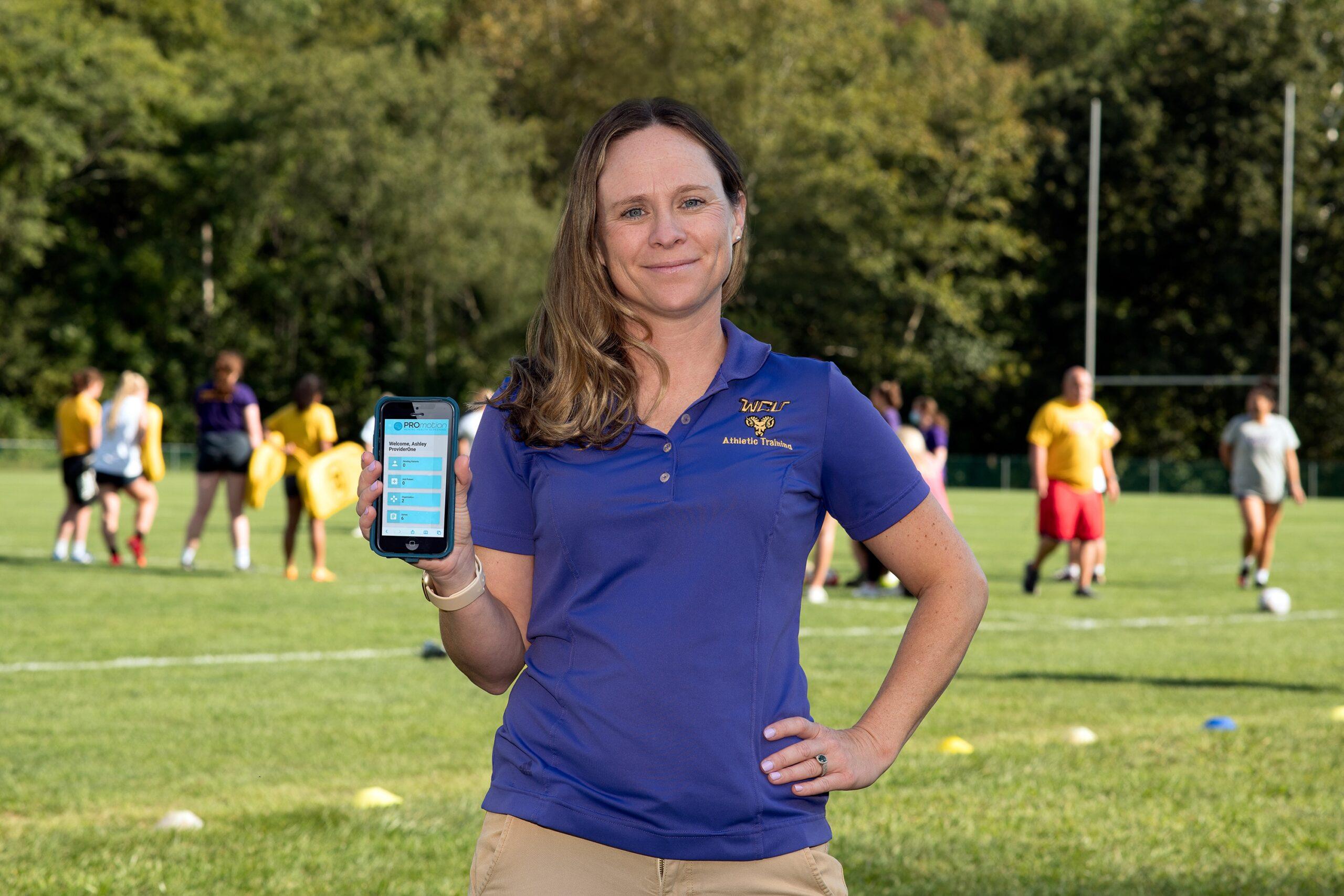When the 45 to 50 women on West Chester University’s rugby team arrived for their annual mental health training in 2016, athletic trainer Lindsey Keenan, Ph.D., stood by with paper and pencil to complete student-athlete mental health screenings.
With such a cumbersome process, Keenan knew something needed to change.
Passionate about student-athlete well-being and hopeful to discover a way to combat their mental health struggles, Keenan began working with several colleagues on a grant from the NCAA in 2016. With the money from the grant, the group developed and created the app PROmotion, which officially launched in 2020.
A mental health screening platform developed for athletic trainers, psychologists and health care providers, PROmotion is capable of screening hundreds of athletes at once. Currently, 22 colleges and universities have paid for the app and are actively using it, Keenan said.
Inspired by the medical term “PROs,” or patient-reported outcomes, PROmotion allows student-athletes to provide feedback on the outcomes they are getting both on and off the field via surveys on the app.
For Keenan, a student-athlete who struggled with her own mental health, open communication about student-athletes struggling with mental health has grown with time.
“I played lacrosse in college, and I struggled with mental health over 20 years ago,” Keenan said. “Nobody talked about mental health then. We’ve actually come a really long way, at least acknowledging that it’s a thing, but now it’s getting all the stakeholders who are involved in student-athlete well-being on the same page to actually address mental health and make it better to create a better environment.”
After the Pennsylvania State Athletic Conference (PSAC) adopted a mental health policy in 2018, which was based on the NCAA mental health best practices, mental health screening became a mandated requirement for every school in the conference, including West Chester.
“It was perfect timing for our app when we started beta testing and then launching that all these schools were like, ‘We need to do screening,’” Keenan said.
Rachel Daltry ’04, M.S. ’05, a sports psychologist at West Chester who graduated from St. Joe’s 4+1 program in psychology and who worked alongside Keenan to develop the app, said communicating in both direct and indirect ways to athletes about mental health is important. Daltry said screening through the app, which is considered an indirect approach, helps to normalize a focus on student-athlete mental health.
“If we’re doing screenings every year or more than that, we can start normalizing it,” Daltry said. “It’s something that is just like any other part of your health and well-being.”
Normalizing screening means more athletes are willing to share their struggles with her, Daltry said. In fact, Daltry said one student-athlete who consistently checked off zeroes on the paper and pen screenings eventually opened up about what really was going on through PROmotion.
“One day, one semester, they marked that they had suicidal thoughts,” Daltry said. “It took all of those years for them to get the courage to share that and take that chance to share that they have been struggling for years.”
With the app, student-athletes are granted privacy that protects their responses from teammates and coaches, which often helps them to open up more freely, Daltry said.
That was the experience for West Chester senior women’s rugby player Brooke Crago.
“It’s a lot easier to talk about it and go about it in a professional way that none of my teammates will really know,” Crago said. “Being very transparent about mental health issues and having an app that allows us to do so in a private, confidential and secure way helps bridge the relationship between student-athletes and athletic trainers to become stronger and more fruitful.”
PROmotion measures a variety of areas of mental health, such as depression, anxiety, ADHD, sleep and eating habits. In Crago’s case, Keenan was able to examine her results from the screening, identify signs of potential ADHD, as well as note improvements.
“Based on all my results and everything, Lindsay was like, ‘Have you ever been tested for ADHD before?’” Crago said. “She actually got me in touch with people and providers within our school to get me tested for ADHD, and it helps monitor my anxiety. I have depressive symptoms, and since freshman year to now, my scores have gone up and she’s been able to notice that.”
Crago said the introduction of PROmotion helped to destigmatize the mindset around student-athlete mental health issues.
“Whenever she introduced all of this, she presented it to us as an app for mental health and that made me, as a student athlete, already feel more accepted,” Crago said. “To know that this was created specifically for this reason made my feelings and my experiences all the more valid and all the more accepted.”
Daltry said the app has not only brought student-athlete mental health to the forefront of people’s minds, but it has also helped become a resource for caring for student-athletes beyond athletics.
“I focus so much on our athletes who are humans. They are not just robots who are here,” Daltry said. “To perform a certain way of life, we have to help them take care of their full human experience. I think this is a nice way to get in there and do that and have those difficult and uncomfortable conversations.”

This story is part of a series focused on college athletics and mental health. It highlights ongoing efforts by different programs and individuals to break the stigma surrounding mental health across the NCAA.







































